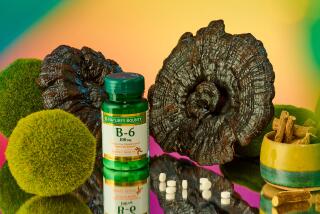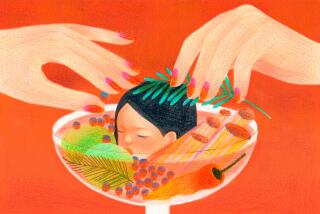A push over the edge?
- Share via
Energy drinks are the target of many complaints: too much sugar, too much caffeine and too many herbal extracts with dubious claims. Now, researchers say the drinks may lead to drug abuse.
In a paper published online last month in the journal Drug and Alcohol Dependence, Roland Griffiths of Johns Hopkins’ School of Medicine in Baltimore and his coauthors highlighted the risks of consuming too much caffeine via energy drinks, including caffeine toxicity and dependence. Last week, Griffiths also sent a letter, signed by 97 other experts in addiction and drug abuse policy, to the U.S. Food and Drug Administration calling for federal regulation of the labeling and content of energy drinks.
Griffiths and co-signers are not just worried about the risk of overdosing on caffeine. They also fear that the beverages -- with names such as Fixx and Buzzwater -- and a marketing strategy that plays on an edgy, even illicit image, may make them “gateway” products.
Gateway is used to describe a drug such as marijuana -- or in this case, a product -- that increases the risk of abusing harder drugs. (The association between smoking marijuana and later use of highly addictive drugs such as heroin or cocaine is a point of debate.) In other words, kids who start on energy drinks may progress to other substances -- cigarettes, alcohol, marijuana and stimulants.
So, how strong is the evidence linking energy drinks to subsequent substance abuse? Data are scant, but some studies have shown higher rates of heavy alcohol consumption and recreational drug use. Researchers are particularly concerned about abuse of prescription stimulants such as Ritalin and Adderall, used to treat attention deficit hyperactivity disorder.
In a study published in March in the Journal of American College Health, 795 college students answered questions about energy drink consumption, drug use and other risky behaviors. Those students who drank at least six energy drinks a month were three times more likely to have smoked cigarettes, abused prescription drugs and been in serious physical fights. They were two times more likely to have smoked marijuana and had alcohol-related problems such as hangovers and blackouts.
“Most energy drink consumers don’t ever go on to problem drinking or illicit drugs use,” says study author Kathleen Miller, a sociologist at the Research Institute on Addictions at the University at Buffalo in New York. But the odds are higher, she says.
Heavy alcohol consumption was linked to energy drinks in a study published in May in the journal Academic Emergency Medicine. In a Web-based survey of 4,271 college students, nearly one-quarter of those who had consumed any kind of alcohol in the previous month had drunk a cocktail of alcohol mixed with an energy drink. Students who drank the mixture reported twice as many episodes of drunkenness and more adverse consequences related to drinking, such as injury, unsafe sex and driving while intoxicated. When asked why they mixed alcohol with energy drinks, some said they wanted to mask the taste of alcohol, while others said they could drink more without feeling or looking as intoxicated.
More evidence for a relationship between energy drinks and later prescription drug abuse comes from a study to be presented this month at a meeting of the American Public Health Assn. Researchers followed 1,253 college students for five years. Students were assessed for energy drink consumption and drug use the summer before freshman year and twice-yearly thereafter. The researchers found that subjects who drank energy drinks consumed more caffeine on average than those who didn’t -- it wasn’t just a one-to-one substitution of energy drinks for coffee, says study lead author Amelia Arria, from the Center for Substance Abuse Research at the University of Maryland in College Park.
And students who consumed energy drinks early in their college years were more likely to later use prescription stimulants such as Ritalin nonmedically. A somewhat weaker relationship was seen with prescription analgesics. (The exact amount of the increases are not available as the paper has not yet been presented.)
But how strongly do these data establish cause and effect -- that use of energy drinks increases the likelihood that someone will go on to abuse prescription drugs? Just because an association is found, it doesn’t mean energy drinks cause these behaviors, Miller says. A person who is likely to enjoy energy drinks -- especially given the sometimes-edgy way they are marketed -- may be also more likely to indulge in use of alcohol, cigarettes and other drugs.
Arria, too, says that her data don’t prove energy drinks cause students to take somebody else’s Ritalin. But because use of energy drinks is so widespread, “perhaps we should be looking at this a little bit more closely,” she says.
Researchers say it’s not just the caffeine in the energy drinks that is troubling. “The issue with the energy drinks is the way that they’re marketed,” Miller says.
Griffiths points to the drug culture language used by energy drink producers. The energy drink Bawls promises “a powerful rush of caffeine”; for SexDrive, it’s “a feeling of well-being”; 5-hour promises “no crash and no jitters”; with Monster, it’s “a wicked mega hit that delivers twice the buzz”; and Cocaine: the “world’s most dangerous energy supplement.”
The research on energy drinks is still in its infancy, and more must be done to confirm the gateway hypothesis. But it makes sense, Griffiths says. By sponsoring extreme sports and promising to enhance performance and stamina -- “ ‘slam the can,’ as they say before a competition” -- energy drink makers are selling a message along with their product.
“If you buy into that [message] and then you’re offered some Ritalin by your college roommate, it’s an easy line to cross over,” Griffiths says. “But I think as a society, we want to make that a very bright line.”
--
The buzz on buzz
You can read more about the issue and the risks of caffeine intoxication -- a recognized medical syndrome characterized by such symptoms as nervousness, tremors, gastrointestinal upset and rapid heartbeat, at latimes.com/energydrinks.






